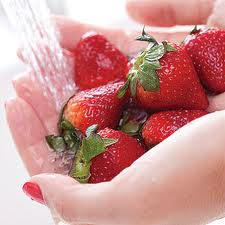
Located in the small of the back and shaped like beans, the kidneys not only store electrolytes, minerals and salts, they eliminate toxins and wastes from the blood in the form of urine. Optimal kidney functioning is extremely important for anyone who desires to achieve and maintain overall body health. When problems arise and the kidneys become dysfunctional, the body can experience lethargy, a loss of appetite, drowsiness, muscle cramps and flu like symptoms. The way to increase kidney function is by making some adjustments in your diet and lifestyle.
Many people do not know that when kidneys are not healthy, other areas in of the physical and mental health are compromised. Kidney disorders can lead to many serious degenerative diseases, such as heart disease, cancer, stroke, diabetes, and high blood pressure. These are among the leading causes of deaths, worldwide.
According to the National Kidney Foundation, one of the key functions of the kidney is to filter the blood--keeping it free from toxins and other waste products. The kidneys are also responsible for regulating and maintaining the concentration and volume of blood, in the body. In other words, the kidneys help to maintain the right quality and quantity of blood. This is important to note since the quality of blood directly affects the quality of overall health.
➢ transportation of nutrients, oxygen, and hormones around the body
➢ protection against diseases, including cancer cells, and
➢ helps stabilize the pH balance.
When the kidney is not able to properly discharge its functions, the result is poor health and possibly premature death.
It’s not just seniors who are experiencing kidney failure these days. Teens, athletes, couch potatoes, people who are overweight and inactive adults alike are coming down with such problems because of inadequate water and fluid intake. Kidney failure causes toxins and waste products to accumulate in the body, and disrupts the chemical balance, viscosity (thickness) and volume of blood and other body fluids. Eventually, this can lead to hypertension and diabetes, which in turn can lead to heart disease and stroke. Further, the compromised quality of blood leads to a depleted immune system, which increases the risk of cancer and other serious diseases.
Like the majority of optimal wellness plans--starts with the daily diet. A few changes in how people consume their foods drastically aids in attaining optimal blood pressure. With hectic lives filled with technology, over-worked schedules and over-conveniences, too many of us have developed poor eating habits, excessive consumption (with emphasis on more refined foods, sugar and chemicals, rather than fresh fruits and vegetables) and inactivity.
Factors such as higher potassium intake, a reduction in alcohol consumption and maintaining a healthy body weight all help in controlling blood pressure. Fresh and organic (best choice, when possible) fruits, vegetables, and nuts and legumes are the optimal choices. Many of these foods contain antioxidants that play an important role in protecting the body against diseases, boosting the immune and defense systems and eliminating free radical damage. Limiting fats (especially Trans fats) and high glycemic carbohydrates such as white bread, pasta, sugar, and sweets, which lead to inflammation, is essential. Not only that, research shows that the newest approach of eliminating wheat and cornstarch from the diet (many of these which are genetically modified) is showing great promise in lowering blood pressure.
Control your blood pressure. Having high blood pressure, known as hypertension, can also contribute to kidney disease. To avoid this from happening, keep your intake of salt to low levels. Blood pressure reductions of 20 – 40 mmHg have been seen with this approach alone.
Also, watch your protein intake. If the kidneys are working properly, wastes get removed and protein stays in the blood. But when the kidneys are weak, the protein may not get separated from the wastes. If you have low kidney function, do not eat high amounts, as would be the case with a high-protein diet. Stick to the RDA protein guidelines of 10 to 35 percent of your total daily caloric intake.
Aerobic exercise such as walking daily for as close to one hour as possible (or more) may help prevent kidney disease. Most Americans sit at a desk all day without regular and consistent body movement. By implementing a program of regular exercise, you will help to lower your blood pressure and prevent diabetes, heart disease, obesity, stroke, and kidney failure.
Buy a simple pedometer and try to walk 10,000 steps a day. Challenge yourself to go outside and breathe in the fresh air and get some sunshine. Small steps can lead to great organ and overall health!
Such an important factor in overall health! Adequate water consumption is not only important for kidney health but many other biological functions. If you are more active and live in drier or hotter places, adjust your water intake to more than just the typical “8 glasses a day.” Carry a water bottle around with you at all times. This habit will help you stay hydrated sub-consciously!
Persons with kidney failure must be careful of the supplements they take and always check with their Nephrologist first. Always avoid cigarettes and second hand smoke. For those with normal kidney function, many clinical trials and retrospective studies have shown the value of certain supplements in lowering blood pressure and aiding kidney function.
One of the many remarkable benefits of Vitamin D3 is its ability to help reduce blood pressure. Vitamin D3, also known as the “sunshine vitamin”, can be manufactured in the skin when the body is exposed to sunlight. However, as we age, the absorption of Vitamin D3 can be decreased. Vitamin D3 is the active form of Vitamin D. Vitamin D2 is a cheaper synthetic version that is ineffective. Vitamin D is necessary for healthy bones, muscles, and cells. It also helps the body absorb and use phosphorus and calcium. When one is exposed to sunlight for 15 to 20 minutes a day, they can absorb about 10,000 – 15,000iu vitamin D3 each day.
Studies have repeatedly linked the active form of the nutrient (Vitamin D3) to blood pressure. People deficient in Vitamin D3 are more likely to have high blood pressure as well as high cholesterol. Vitamin D likely exerts its effect by suppressing the expression of the blood pressure hormone rennin, similar to the effect of prescription angiotensin converting enzyme (ACE) inhibitors.
Coenzyme Q10 is a potent antioxidant that promotes healthy blood pressure levels. Data from twelve studies showed a significant drop in blood pressure.
Anthocyanins are plant flavonoids such as cranberries, blueberries, elderberries, eggplant, grapes, red wine, pomegranate, and other similarly colored fruits and vegetables. A French study showed that anthocyanins are natural inhibitors of the angiotensin-converting enzyme that increases blood pressure.
Magnesium Glycinate is one of my favorite minerals to help reduce blood pressure and preserve kidney function. In one recent study magnesium supplementation reduced systolic blood pressure by 5.6 mmHg and diastolic blood pressure by 2.8 mmHg.
Omega 3 Fatty Acids from fish oil help to reduce blood pressure and reduce inflammation in the body. Most people know about fish oil but do not take enough of it or are taking a brand that does not manufacture a high quality oil, thus the inability of the body to absorb and utilize the nutrient correctly. In order to obtain the optimal effects, stick to brands that are ranked well, such as, Life Extension, Premier Labs, Twin Labs or Nature’s Way.
The best omega 3 supplement usually passes through a process called molecular distillation. This process removes all the contaminants and pollutants like mercury, lead and PCB’s for example. (It purifies the fish oil 100%). Take between 2-4 fish oil per day or 2000 mg. (This is the average for healthy people).
GABA is a calming neurotransmitter made from the amino acid glutamic acid. GABA is known to control blood pressure by inhibiting the release of the stimulant neurotransmitter noradrenaline. To help lower elevated blood pressure that’s exacerbated by stress and an insufficient amount of calming neurotransmitters, 100 mg of GABA twice a day is recommended.
Resveratrol inhibits the angiotensin-converting enzyme helping to reduce blood pressure.
Melatonin which helps to enhance sleep and prevent cancer also reduces blood pressure during sleep. If you’re over 50, consider Melatonin 3 mg at night.
The best treatment of kidney disease is prevention. Optimize kidney health by consuming the right types and quantities of foods, exercise regularly, drink adequate amounts of water and observe other healthy habits, such as adequate rest, recreation and stress management. At all cost, avoid destructive lifestyle habits such as smoking, drug and alcohol abuse and stress. Try to do something nice for yourself every day. By taking care of your kidneys, you will discover more energy and feel better overall. You, your kidneys and your mental wellbeing deserves it!
Mayoclinic.com, comprehensive-kidney-facts.com
